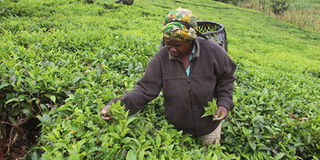Brace yourselves for lower tea bonus, KTDA tells farmers

A farmer picking tea in Nyeri. KTDA Chairman Peter Kanyago said farmers have produced 1.2 billion kilogrammes of green leaf compared to 931 million kilos last year which will lead to a decline in bonuses to farmers. PHOTO | FILE | NATION MEDIA GROUP
What you need to know:
- Mr Kanyago said that KTDA has a lot of stock for made teas stashed at the Mombasa warehouses.
- He added that the implementation of the newly released tea regulations is the beginning of the end of the tea sector.
The Kenya Tea Development Agency (KTDA) has asked farmers to brace for lower bonuses this year. This is due to overproduction of tea which has seen output increase by 29 per cent.
Speaking during a press briefing at Iriani Tea factory in Nyeri, KTDA Chairman Peter Kanyago said farmers have produced 1.2 billion kilogrammes of green leaf compared to 931 million kilos during the same period last year.
“We know what happens in the rule of demand and supply. We have a lot of tea but the prices have gone down,” he said.
He further said that the bonus will be affected by the plummeting of tea prices at the Mombasa auction, from Sh277. 03 ($2.6) to Sh220.23 ($2.06) during the last auction.
MORE TEA
“We have more kilos of tea that we have sold, meaning the revenue might be the same but the rate per kilo might be much lower this year than the previous year,” he added.
At the same time, Mr Kanyago said that KTDA has a lot of stock for made teas stashed at the Mombasa warehouses which has increased by 78 per cent from 42.3 million kilogrammes to 75 million kilos as at last month.
He added that the implementation of the newly released tea regulations is the beginning of the end of the tea sector should they be implemented as they are.
“The regulations should be modified, otherwise the tea sector is about to suffer the same fate as other failed industries in the country such as coffee, pyrethrum and sugar,” he said.
In addition, the KTDA chairman said the regulations will see international tea buyers shun away from locally produced crop.
BUYERS' DEMANDS
Mr Kanyago also said that the drafters of the regulations failed to consider that some buyers demand specifically blended tea at factory level based on their needs.
“These buyers will definitely move to other tea producing countries that can make their tea according to their preferences,” he said
He further stated that the regulation that outlaws sale of tea directly to overseas buyers will not see farmers earn more.
“That regulation is detrimental and selling all tea at the auction will not improve farmers’ pay. Rather, there will be increased tea at the auction and with the rule of demand and supply in place, the move will see farmers earn even less,” Mr Kanyago said.
He further said the proposal that requires buyers to submit a performance bond equivalent to 10 per cent of the estimated tea value auction prior to the auction will push them to other tea producing countries.
“All teas that are sold through the auction are paid within 10 days without default. The performance bond requirement will force buyers out of our market because it makes our teas more expensive than other tea producing countries,” he said.
He lamented that there was no consultation with stakeholders and county governments given that agriculture is a devolved function.





